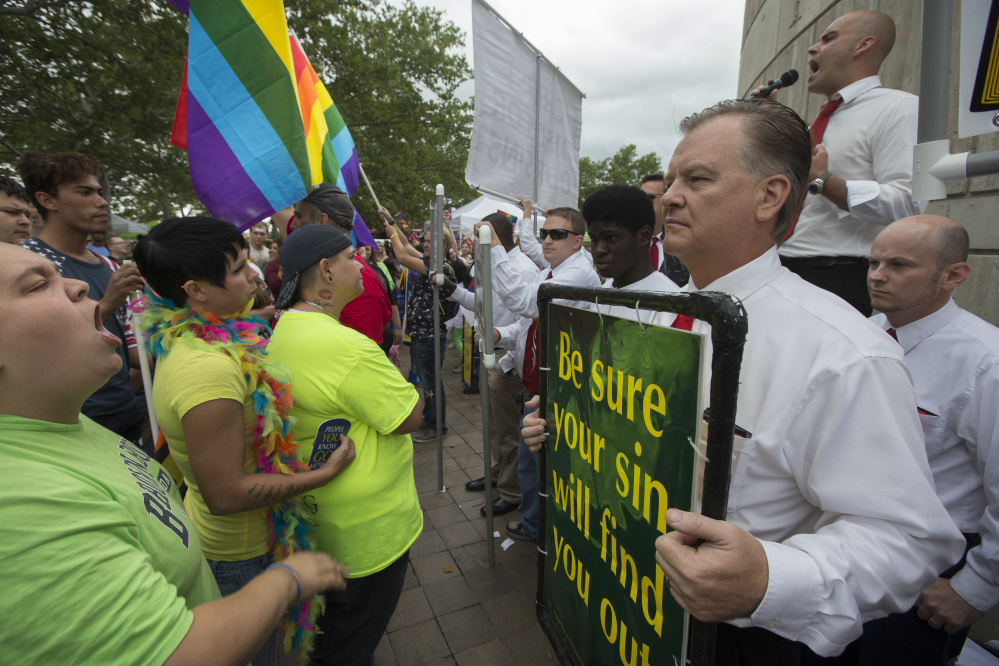Fresh off their biggest legal victory, gay rights supporters began to expand their efforts beyond same-sex marriage to a broad push to rewrite civil rights law and extend protections to other personal and financial actions.
A liberal coalition spanning gay rights groups and traditional African-American leaders turned its attention to a new legislative bid to outlaw discrimination against homosexuals in employment, housing, financial dealings and other regular actions not protected under the Supreme Court’s ruling declaring same-sex marriage a constitutional right.
“You can be married on Saturday, post your pictures on Instagram on Sunday and fired from your job on Monday,” Rep. David Cicilline, D-R.I., the lead sponsor in the House of the new legislation, said Saturday.
After Friday’s ruling, Sen. Jeff Merkley, D-Ore., the sponsor of the legislation in that chamber, emailed thousands of supporters asking them to get behind the new bid because, despite the marriage decision, it is still legal in some states to “kick someone out of a diner or other public accommodation because of who they love.”
While Cicilline and Merkley plan to formally introduce the legislation next month, they acknowledged that it will be an uphill battle in the near term to win approval of an expansive gay rights agenda. Republican leaders in Congress, while trying to avoid inflammatory statements about the decision, have shown no appetite for a debate that would open up gay rights beyond what the federal courts have established.
CONSERVATIVES’ CONCERN
Sen. Charles Grassley, R-Iowa, chairman of the Judiciary Committee, expressed concern that conservative institutions would be forced to take actions against their religiously held belief opposed to gay marriage. “Everyone deserves to be treated with respect, and nobody should have their deeply held religious beliefs trampled by their government,” he said after the ruling.
On the campaign trail some Republican contenders for the 2016 presidential nomination grabbed hold of the Supreme Court ruling to try to appeal to social conservatives in key early primary states. After Friday’s ruling, Sen. Ted Cruz, R-Texas, a member of the Judiciary Committee that would have oversight of Merkley’s legislation, called for elections that could be held to throw justices off the Supreme Court.
In the short run, gay rights supporters also focused on shoring up implementation of the court’s marriage ruling, as some of the most conservative-leaning states have governors or attorneys general who are refusing to uphold the decision and allow same-sex marriages in their states.
Campaign for Southern Equality, which has worked to advance gay marriage rights, filed a brief with the U.S. Court of Appeals for the 5th Circuit, based in New Orleans and covering a bloc of Southern states, asking those judges to immediately lift their stay on a lower-court ruling in Mississippi that allowed for same-sex weddings. Despite the Supreme Court’s ruling, state Attorney General Jim Hood has said that the federal courts in his region need to act first, leaving same-sex marriage blocked in Mississippi.
OPTIMISM AND EFFORT
Despite those hurdles, supporters of gay rights expressed long-term optimism, particularly after the ruling written by Justice Anthony Kennedy, a 1987 appointee of President Reagan. In an interview Saturday, Merkley cited “Kennedy’s clarion call about dignity in the eyes of the law” but noted the need to extend the effort.
“You can’t have dignity in the eyes of the law if you can still be discriminated against in mortgages,” Merkley said.
More than half the states do not have laws protecting against discrimination based on sexual orientation, meaning that landlords, banks and restaurants in those states can discriminate.
For the previous 20 years, the leading gay rights advocates had been promoting the Employment Non-Discrimination Act, which was originally authored by Sen. Edward Kennedy, D-Mass., and Merkley took up as Kennedy became ill and died in 2009. In November 2013, Merkley succeeded in winning ENDA’s passage in the Senate, but it languished in the Republican-controlled House.
Soon after the Senate vote, the liberal coalition decided to go bigger and draft legislation that would provide many more protections against discrimination. According to Winnie Stachelberg, executive vice president of external affairs at the Center for American Progress, the expansion of same-sex marriage at the state level in recent years brought on a “backlash” against those couples as their private lives became more public.
A key difficulty Merkley and Cicilline face is that, to be successful, they will have to amend the landmark 1964 Civil Rights Act. Black leaders normally resist opening up the law for fear that it would lead to rollbacks in the protections it afforded based on race and ethnicity.
They have built their coalition beyond the obvious allies to include prominent black leaders and organizations.
Send questions/comments to the editors.



Success. Please wait for the page to reload. If the page does not reload within 5 seconds, please refresh the page.
Enter your email and password to access comments.
Hi, to comment on stories you must . This profile is in addition to your subscription and website login.
Already have a commenting profile? .
Invalid username/password.
Please check your email to confirm and complete your registration.
Only subscribers are eligible to post comments. Please subscribe or login first for digital access. Here’s why.
Use the form below to reset your password. When you've submitted your account email, we will send an email with a reset code.